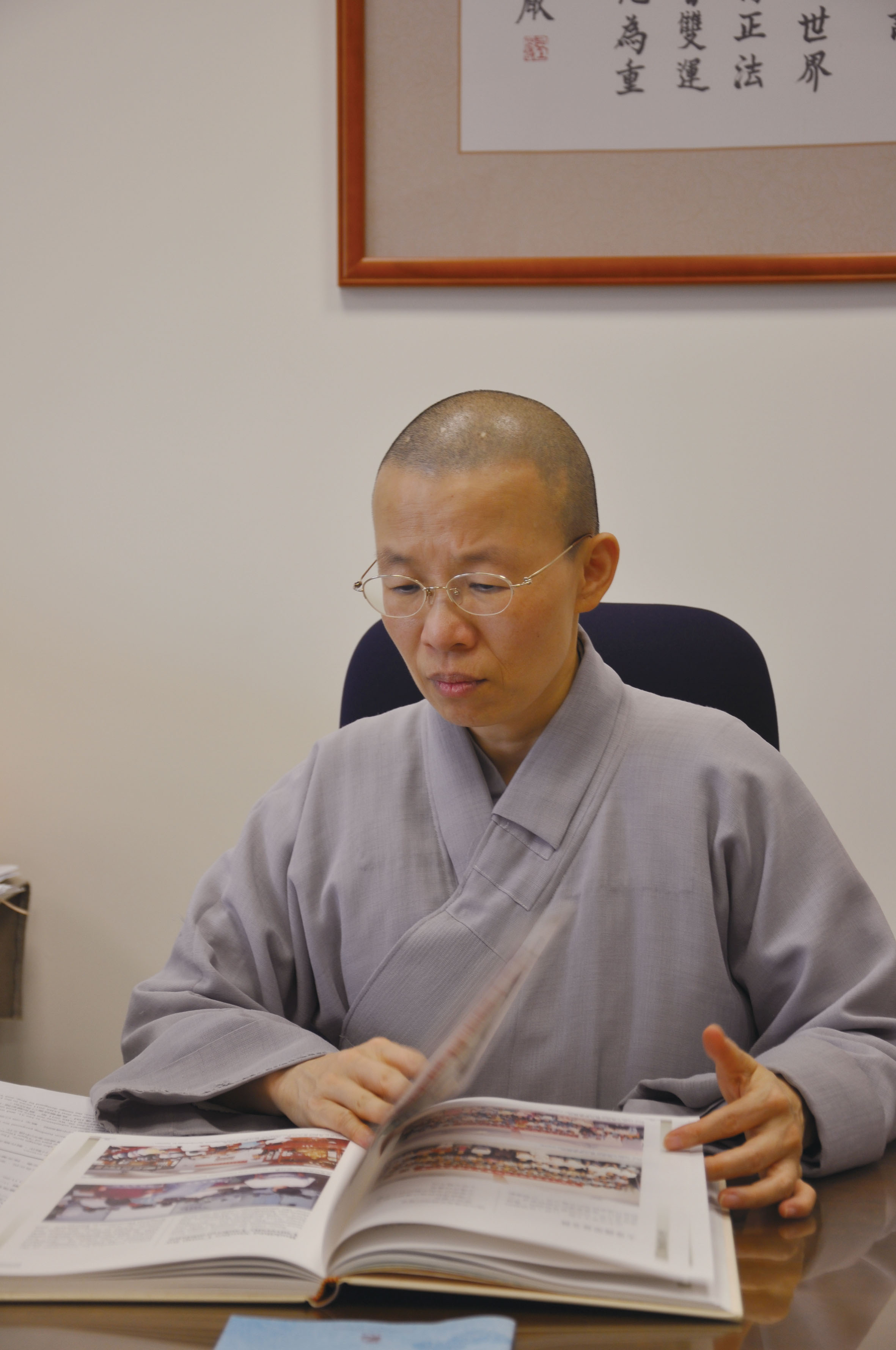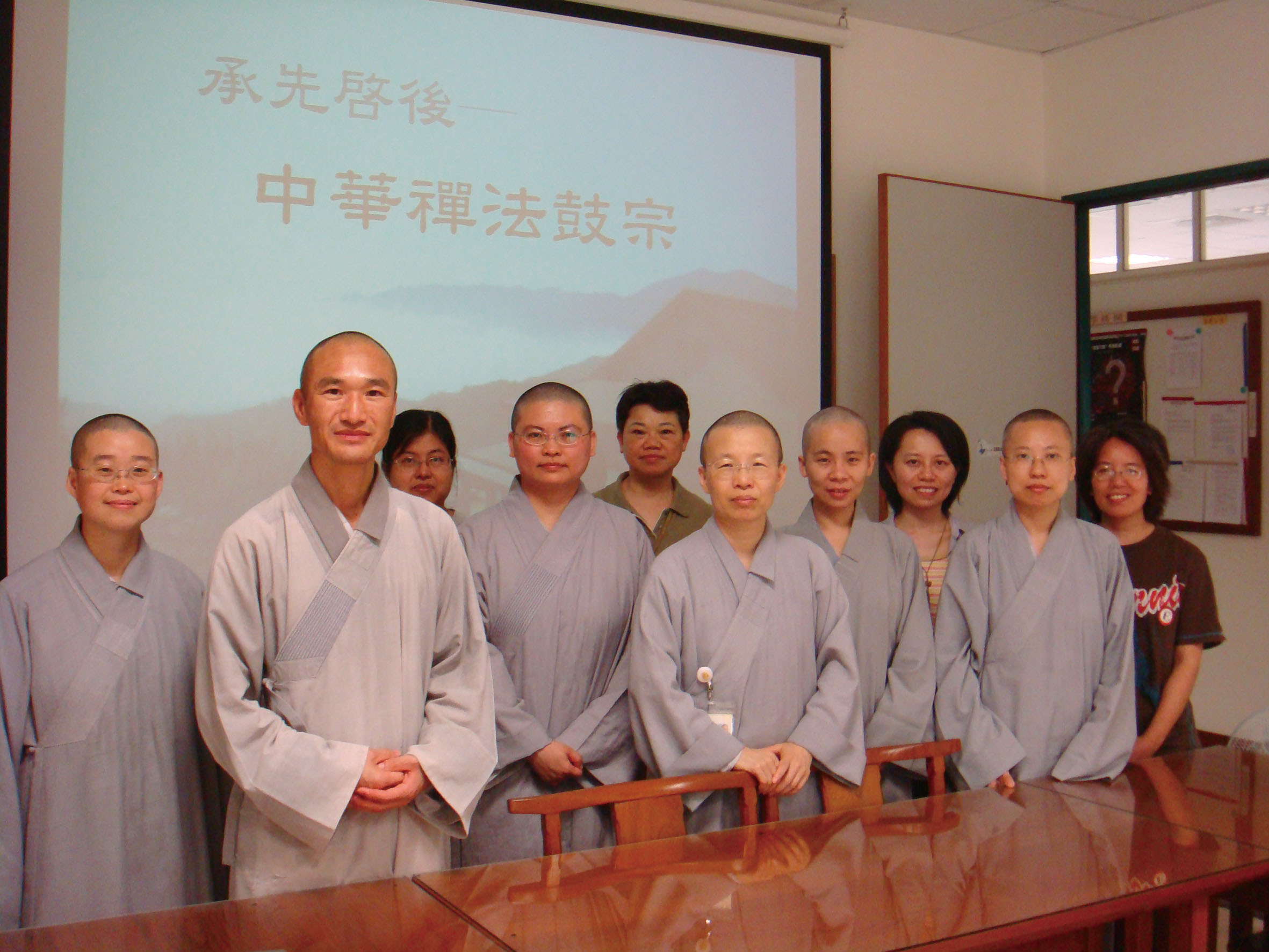奠定佛教教育的基業
所長 果鏡法師

跟隨聖嚴法師在佛陀成道處打坐,體會佛陀的慈悲智慧。
On Pilgrimage in Budhgaya.
本所自創辦以來已30年了,當向本所創辦人 聖嚴師父(以下簡稱創辦人)請教要辦什麼活動慶祝時,創辦人毫不猶豫地做了這樣的指示:「就做本30周年的紀念刊吧!」今年(2009)2月3日創辦人的捨報辭世,三十周年特刊的出版成了創辦人對本所的最後囑咐。
創辦人在1960年九月的《人生》雜誌上寫到:「中國的佛典最豐富,中國的佛教最高深,近代中國的佛教徒,卻是最無能。」對於近代中國佛教的衰弱,創辦人早期就留露出無比的沉痛與強烈的責任感,他指出「身為漢語中國人的佛教徒應該深自感愧,中國佛教在這方面不僅做的太少,簡直還沒有開始。」對比歐美、日本、泰國等國家有宗教系、佛教學系,甚至是佛教大學,中國佛教卻連一所以培養人才為目標的教育機構都沒有。因此,成立一所完整的教育體系,創辦為佛教造就人才的機構,便成為創辦人盡形壽的使命。

在方丈和尚主持下,繼果肇法師後,成為佛研所新任所長。
Passing the Seal of Office to Ven. Guo Jing, 2008.
創辦人於1969年留學日本立正大學,短短的六年間取得文學碩士、博士學位。1978年接受邀請擔任文化大學「中華學術院佛學研究所」所長,此是中國教育史上第一次有完整的佛教學術教育進入正式的教育體制。可惜在1985年中華學術院佛學研究所因為因緣變遷改制,無法繼續辦學,創辦人將其轉至北投中華佛教文化館成立「中華佛學研究所」。
中華佛學研究所雖是私人辦學,但其學制、教學完全符合高等教育所要求的學術研究訓練,例如:學生考試入學,修滿一定的必修、選修學分,畢業必需撰寫論文等等。本所在創辦人的願心下,除了聘請優秀的師資教學,還定期邀請國際知名學者講學交流,發行《中華佛學學報》與《中華佛學研究》期刊、學術論叢,並舉辦國際性學術會議,進一步更發展佛學與現代科技結合的數位典藏等等。在課程的教學上,特別重視經典的解讀,以及古典佛典語言(梵文、巴利文、藏文)和現代語言(英文、日文)的訓練,期能為學生的長遠學習打下深厚的基礎。
本所在校同學除了學費全免外,還提供食宿、每月生活津貼,甚至為鼓勵學生畢業後進一步赴國外進修,由法鼓山人文社會基金會捐助提供獎學金,期許培育出佛教文化、教育與學術的一流人才。這一切從無到有的辦學經歷,創辦人為了讓師生能夠安心教書、讀書,從未吐露過任何的募款辛勞和辦學困難之心聲,只開示同學們「道心第一,健康第二,學問第三」的學習座右銘。並經常以自己學習經驗為例,鼓勵學生不應擔憂個人的資質不夠,強調只要發心來此學習的人都是「人中龍鳳」,心胸要能裝進全體的佛教和無邊的佛法,眼光要看向可憐憫的眾生和苦難的世界,秉持所訓「立足中華,放眼世界;專精佛學,護持正法;解行互資,悲智雙運;實用為先,利他為重」的所訓方針與目標,以菩提心努力用功,成為行菩薩道的大師級龍象宗教師。
創辦人創辦本所是為「全體佛教的深遠發展」而培育人材,是以「信仰為目的、學術為方法」的目標,期望把佛教傳統豐富的文化和信仰,透過現代學術觀點和研究方法,給予新的闡釋和生活的運用,讓現代人能簡易又正確地認識佛教,對時代社會提供佛教的智慧結晶,進而淨化、改善我們的社會。因此,在這本紀念刊中,除了展現本所30年辦學成果外,在特別專題中以「佛學與修行」為主題,敬邀本所的高明道、厚觀法師、楊郁文、威廉馬紀等老師提供他們的經驗,希望透過這些老師的自身經驗,可以讓我們更能體會學術與修行的分際與融合,以消靡部分人對佛學與學佛的疑惑!
本所30年來穩健踏實的成長,不只贏得國內教界良好的口碑,也在國際展露頭角,獲得各界的肯定,因此本刊擬定了幾個特別專題,以期能凸顯本所辦學的特色。其中藍吉富老師的〈中華佛學研究所與台灣的佛學研究〉一文,從整體國際佛學學術研究的角度,談佛學研究所的辦學特質與貢獻;杜正民老師的〈佛學與資訊發展〉一文,細數主持本所「佛學網路資料室」以及參與執行的幾個劃時代「數位佛學參考資料庫」的介紹;廖本聖老師的〈西藏佛學組暨漢藏佛教文化交流研究班〉一文,詳述本所西藏佛教組的歷年師資和課程特色,以及成立漢藏班的因緣歷史;惠敏法師的〈從「中華佛學研究所」到「法鼓佛教學院」〉一文,談及佛教高等教育辦學的經過與法鼓佛教學院的成立;最後以哥倫比亞大學于君方教授的〈聖嚴法師與漢傳佛教〉和佛羅里達州立大學俞永峰教授的〈聖嚴法師與禪宗之現代化建構〉二文,闡述創辦人思想特色和禪法,做為此專題的精采尾聲。

在人物聚焦中,除了一些與本所有深厚因緣的師長外,本刊還特別向畢業的學生、職員和護持菩薩邀稿,透過他們護持本所的真誠心,可以看到創辦人的悲願力如何展現,讓一個個生命得到轉變與內化。創辦人常開示說:「因種對了,待因緣匯聚,自然就會結成美麗豐碩的果實。」
多年來創辦人在國內、國外各處奔波,只要在國內,一定會抽空對本所學生諄諄教誨,這也說明了創辦人對培育佛教高等教育人才的殷殷期盼。 創辦人圓寂後的今日看來,這些叮嚀與囑咐更具時代的意義與重要性。在創辦人時間中,我們特別選出五篇代表文章,提醒自己肩荷重任,勿負囑託!
希望透過這本30周年特刊的出版,能讓諸位大德更瞭解創辦人創辦本所辦學的宗旨、方針與特色,進而感恩、緬懷創辦人一生投入培育、教育佛教人才的時代意義。

秉承師志,以弘揚漢傳佛教為己任。
Laying the Foundation for Buddhist Education
Venerable Guo Jing
Director of CHIBS

It has been 30 years since our institute was founded. When I asked the founder of our institute, Master Sheng Yen, about what celebration activities were to be held, Master Sheng Yen directed me without any hesitation by saying, “Let’s do a 30th anniversary special publication!” With Master Sheng Yen’s passing on February 3, 2009, this special publication thus became his final exhortation to our institute.
In Humanity Magazine Master Sheng Yen wrote, “While Chinese Buddhist texts are most comprehensive and Chinese Buddhism the is most profound, Chinese Buddhists in the recent era are least capable.” Regarding the decline and sluggishness of Chinese Buddhism in the recent era, Master Sheng Yen felt immense sadness and a strong sense of responsibility in his early years. As he pointed out, “Chinese Buddhists should feel deeply ashamed of themselves, for Chinese Buddhism has done so little, or nothing to be exact.” Compared with some European countries, the United States, Japan, and Thailand, where departments of religious studies, departments of Buddhist studies, or even Buddhist universities have been founded, Chinese Buddhism hasn’t seen a single educational institute with an aim to nurture talent. Therefore, it became Master Sheng Yen’s lifetime mission to form a comprehensive educational system and to establish an institute to nurture talent for Buddhism.
Master Sheng Yen went to Rissho University in Japan for further study in 1969, and obtained the Master’s and Doctor’s degrees of Literature in only six years. In 1978, on invitation of the Chinese Culture College, he was appointed Director of Chung-Hwa Academy Institute of Buddhist Studies, which marked the incorporation of academic Buddhist education into the official educational system in Chinese education history for the first time. But it was a pity that the Institute had to stop its operation in 1985 due to its reconstitution. So Master Sheng Yen relocated the institute to the Institute of Chung-Hwa Buddhist Culture, where he established the Chung-Hwa Institute of Buddhist Studies (CHIBS).
Though a private institute, CHIBS meets the requirements for academic and research training as a higher educational institute in terms of its academic system and teaching. For example, the students have to take entrance examinations, complete required and elective credits, and write a graduation dissertation. Thanks to the great vow of Master Sheng Yen, our institute has recruited faculty of excellence and has regularly invited internationally renowned scholars for academic exchange. The institute has issued journals such as the Chung-Hwa Buddhist Journal, the Chung-Hwa Buddhist Studies, and collections of academic papers, has held international academic conferences, and has developed digital archives integrating Buddhist studies and modern technology. In the classroom, the institute especially emphasizes the interpretation of Buddhist texts, and the learning of classical Buddhist languages, such as Sanskrit, Pali, and Tibetan, as well as modern languages, such as English and Japanese, in the hope of laying a solid foundation for the students’ long-term study.

參加第一屆世界佛教論壇。
At a conference in Mainland China, 2009.
The students of our Institute enjoy tuition exemption, along with free accommodation and meals, as well as monthly allowances. To facilitate further studies, the Institute provides promising graduates with scholarships raised by the founder and funded by the Dharma Drum Humanities and Social Improvement Foundation, with an aim to nurture top talent for Buddhist culture, education, and academics. Master Sheng Yen never complained about the hardship in fundraising and difficulties in the process of starting this education program from scratch, so that the faculty and students could concentrate on their teaching and studies. Instead, Master Sheng Yen gave the students the admonition: the mind for the Path first, personal health second, and knowledge the third place. He would often use his learning experience as an example to encourage students not to worry about feelings of inadequacy. He emphasized that whoever resolves to study at the institute should be seen as the cream of society, and that the students should embrace Buddhism as a whole, concern themselves about the suffering of sentient beings, and uphold the guidelines and goals as reflected in the institute Principles: “Our roots are Chinese, our branches are global. Our specialty is Buddhist Studies, and our aim to uphold orthodox Buddhism. We combine understanding with practice, and join compassion with wisdom. Practicality is our priority, and benefiting others is our emphasis.” He encouraged them to work hard with a Bodhi mind to become leading religious teachers of the bodhisattva path.
Master Sheng Yen established the Institute to nurture talent for the far-reaching and lasting development of Buddhism as a whole, with the goal to foster faith as the aim and research as the method. He hoped to give a new interpretation to enrich Buddhist cultures and beliefs and to make them more applicable in daily life by means of modern academic perspectives and research methods, enabling people nowadays to access Buddhism more easily and to gain a correct understanding of it, providing society with Buddhist wisdom, thereby purifying and improving our society. Therefore, in addition to showcasing the educational achievement of the Institute for the past 30 years, this anniversary publication’s Feature Essays section features a topic entitled “Buddhist Studies and Practice,” for which the faculty, including Dr. F.F. Grohmann, Ven. Houguan, Yang Yu-wen, and William Magee, were invited to offer their personal experience to help us better understand the division and integration of academic research and practice.
For the past thirty years, with its steady and solid development and growth, the Institute has not only established its stature in Buddhist circles in Taiwan, but also made its name in the international arena, winning recognition from all fields of society. This publication therefore includes some feature essays as a spotlight on the educational features of our institute. In “Chung-Hwa Institute of Buddhist Studies and Buddhist Research in Taiwan,” Lan Chi-fu discusses the educational features of the Institute and its contribution from the angle of international Buddhist research as a whole; in “The Development of Buddhist Studies and Information Technology,” Professor Aming Tu introduces the Institute’s Buddhist Studies Internet Network Center and several pioneering digital databases for Buddhist studies he has participated in and helped actualize; in “Tibetan Buddhist Studies and the Chinese-Tibetan Buddhism Cultural Exchange Program,” Liao Bensheng details the faculty of the Program since its establishment, as well as its program features and the Institution’s history; in “From Chung-Hwa Institute of Buddhist Studies to Dharma Drum Buddhist College,” Ven. Huimin talks about the history of Buddhist higher education in Taiwan and the establishment of Dharma Drum Buddhist College; last but not least, in “Master Sheng Yen and Chinese Buddhism” and “Master Sheng Yen and Modern Chan,” Professor Yu Junfang of Columbia University and Professor Jimmy Yu of Florida State University, explore respectively the features of Master Sheng Yen’s thoughts and the results of his dedication in carrying out Buddhist education.
In the People in the Spotlight section are articles contributed by the faculty members who share a deep connection with our institute, as well as by our alumni, administrative staff members, and our supporters. From the sincerity they show in their support for our institute, one can see how Master Sheng Yen’s compassionate vows have manifested themselves as a force to transform each and every soul from within. As Master Sheng Yen often said, “When the correct cause is sowed, with right conditions converging, beautiful fruit will grow naturally.”
Over the past decades, Master Sheng Yen traveled around both domestically and internationally. Whenever Master Sheng Yen was in Taiwan, he would make time to give talks to the students of the Institute. This showed that Master Sheng Yen had great expectation for the nurturing of talent in Buddhist higher education. Today, as Master Sheng Yen has passed away, these admonitions and encouragements have special significance and importance to our era. Due to the page limitation, we have only selected five representative articles as our reminder that we are shouldering heavy duties and shall not fail in what is expected of us.
With this 30th anniversary special publication, the Institute hopes to let people know more about the founding mission, guideline, and features of our institute. This is our tribute to our founder for his lifelong dedication to educating and nurturing talent for Buddhism.

擊大法鼓,起大悲心。
Beating the dharma drum.







